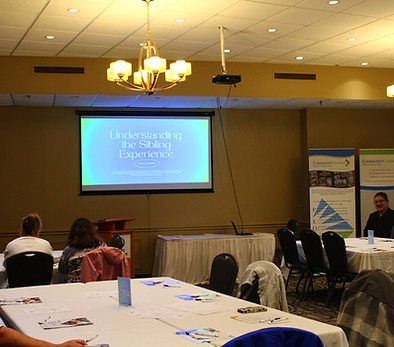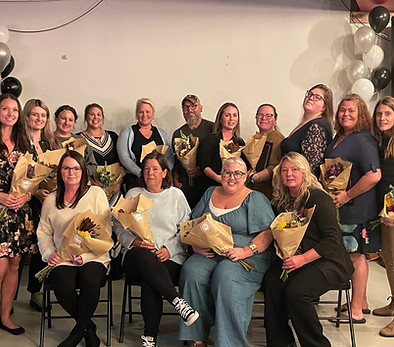
News and Events
Here, you'll find the latest updates, important announcements, and upcoming events that celebrate and support our vibrant community. Stay informed about our initiatives, success stories, and opportunities to get involved with Community Living Upper Ottawa Valley!
CLUOV TEAM ATTENDS OASIS CONFERENCE

From April 30 to May 2, a team from CLOUV attended the annual OASIS Conference in Blue Mountain. OASIS (Ontario Agencies Supporting Individuals with Special Needs) provided the opportunity for thought-provoking plenary sessions, breakout discussions, and top keynote speakers. Attendees networked, collaborated, and charted the future of Developmental Services in Ontario!
UNDERSTANDING THE SIBLING EXPERIENCE WITH HELEN RIES

This May, Helen Ries - co-founder of Siblings Canada - partnered with CLUOV to host the workshop: Understanding the Sibling Experience. Helen spoke to over 30 attendees, both caregivers and family members, about the experience of being a sibling caregiver. Discussion focused on the challenges, resources, and unique dynamics of care families face. We recognize the vital and unique role each care provider holds, and are grateful for all who attended this successful event.
THANK-A-THON - OUR 31 DAYS OF INCLUSION CAMPAIGN

To celebrate Community Living Month this May, CLUOV held a Thank-a-Thon — a month-long celebration of gratitude! Each day in May, we highlighted and thanked those who help build a stronger, more inclusive community. From the incredible people we support and their families to our dedicated staff, community organizations, and valued partners — this month was all about YOU! Check out our Facebook page to read more about some of the lovely people we are grateful for, not only this month, but every month!
INCLUSION AMBASSADORS IN SANTA CLAUSE PARADE

The Inclusion Ambassadors (IA) and CLUOV would like to extend a heartfelt thank you to everyone who helped make our participation in the Pembroke Santa Claus Parade a success! For the IA, this was more than just spreading holiday cheer—it was a chance to connect, build relationships, and share our message of inclusion with the community. We are grateful for the support and the opportunity to showcase the power of inclusion in such a festive and meaningful way. Pictured below is our float and some of the amazing individuals who made it all possible!
INCLUSION AMBASSADORS HOST MULTICULTURAL DAY

On Friday, November 8th, the Inclusion Ambassadors hosted a multicultural day event! Staff and people we support came together to share different dishes from all over the world. The wide range of featured cuisines included: Indian, Canadian, Italian, Greek, and Dutch! Additionally, Madeline Woodfine, a guest speaker from the Local Immigration Partnership, discussed the resources available within the community. Thank you to everyone who attended this fun, informative event!
ANOTHER SUCCESSFUL ANNUAL GOLF TOURNAMENT

We are thrilled to announce that the Community Living Upper Ottawa Valley's 29th Annual Golf Tournament was a resounding success! Thanks to the incredible support of our participants, sponsors, and volunteers, we raised over $13,000! These funds will make a meaningful impact in our community, helping to provide vital programs and services for individuals with developmental disabilities. A heartfelt thank you to everyone who contributed to this amazing event. We look forward to seeing you next year!
CLUOV 66th ANNUAL GENERAL MEETING 2024

On September 25th, CLUOV proudly held our 66th Annual General Meeting. We were honored to hear from Board President Olivia Fraser, Executive Director Tina Williams, Karla Hough from the Ministry of Children, Community and Social Services, and Marcel St. Jean from Community Living Ontario. A special highlight of the evening was the premiere of the inspiring short film *Kirby’s House*, featuring our own Kirby Adam and his incredible journey. Thank you to everyone who joined us in celebrating our community and the important work we do together!
CELEBRATING MILESTONES EMPLOYEE APPRECIATION EVENT

In October we held our annual Milestones Employee Appreciation event, honoring the dedicated team members who have contributed 5, 10, 15, 20 and 25 years of service to Community Living Upper Ottawa Valley. It was a joyous occasion filled with gratitude and recognition for their hard work and commitment to our mission. Thank you to all our employees for your incredible dedication—you make a lasting impact in our community!
31 (NOT SO) RANDOM ACTS OF KINDNESS CAMPAIGN

This May, in celebration of Community Living Month, the staff and people supported by Community Living Upper Ottawa Valley embarked on a heartwarming mission to spread kindness throughout the community. Our "31 (Not So) Random Acts of Kindness" campaign saw daily gestures of generosity, inspiring joy and compassion within the community. Throughout the month, CLUOV engaged in numerous thoughtful initiatives. They handed out loonies for shopping carts at No Frills Pembroke, cleaned up garbage from local parks, donated windshield washer fluid to Danny’s Taxi, and topping up the fluid in cars parked at the office. Donations of spring and summer clothing were made to the Bernadette McCann House, and greeting cards were crafted to brighten the days of residents at Miramichi Lodge. Additionally, our colleagues gave car air fresheners to Tim Hortons employees, offered cold drinks to construction workers on Roy Street, distributed Tide Pods at local laundromats, and much more! We are beyond grateful for all the support we received throughout the campaign, and for the hard work and dedication of our employees who made this possible. Your acts of kindness have gone a long way! Thank you!
CLUOV AT THE PEMBROKE COMMUNITY EXPO

This year, Community Living Upper Ottawa Valley proudly participated in the Pembroke Community Expo, showcasing our dedication to fostering an inclusive community. Our booth was a hub of information about our programs and services. We engaged with visitors, shared success stories, and highlighted our commitment to supporting individuals with intellectual disabilities. The Expo provided a wonderful opportunity for us to connect with community members, partners, and potential volunteers, reinforcing our mission to create a society where everyone belongs. Thank you to everyone who stopped by and supported our vision of inclusivity and empowerment!
INTRODUCING: THE INCLUSION AMBASSADORS

A group of self advocates by the name of The Speakers’ Bureau started meeting in the spring of 2005. Their focus: to reflect, advocate, and champion initiatives to improve the lives of people with developmental disabilities, raise awareness, and encourage community engagement. Almost 20 years later the commitment remains. Membership has grown and changed over the years, but core members continue to lead. The previous Speakers’ Bureau is now thrilled to announce the change of their name. The Inclusion Ambassadors will continue their work advocating and providing leadership on community priorities as well as contributing to the vision, mission and values of CLUOV. This group assists with orientation and employee training, consultation on strategic planning, and development of communication strategies. Watch in the coming months for a heightened presence and new marketing, messaging and merchandise!
5 TO SURVIVE CAMPAIGN: ADVOCATING FOR CHANGE
The current developmental services strategy in Ontario aims for inclusive lives for those with disabilities. However, despite rising inflation costs and the human resource crisis, supportive organizations like CLUOV are largely underfunded. This scarcity jeopardizes the well-being of our community members with disabilities, making it challenging to maintain basic necessities like heating, lighting, food, and support staff. The 5 to Survive Campaign urges the Ontario government to provide an immediate 5% boost to core funding for developmental services agencies, Passport, and Special Services at Home, emphasizing the hashtag #5ToSurvive. Going forward, costs of living and inflation are projected to stay on the rise. It is critical that our developmental service sector be recognized as a critical service, and be provided with the funding it requires to ensure quality support for people with developmental disabilities - a vital part of our community fabric. To support the campaign and amplify our voice, access the #5ToSurvive hashtag on any social media platform and send a message to your representatives at Queen’s Park using the template on the Community Living Ontario Website. Click the image above to watch CLUOV Executive Director, Tina Williams, talk to CLUOV about this issue.
CELEBRATING NEW BEGINNINGS IN NEW SPACES

Spring often signifies new beginnings and growth, and for many individuals supported by Community Living, it brings fresh opportunities as well. Over the next few months, Community Living will assist more than 10 people in transitioning to new homes, enhancing their independence and quality of life. Between March and July, significant moves are planned, including a couple relocating to a seniors’ living facility and two young women leaving their family homes to settle into their own apartment. Additionally, a woman will move into a four-plex that she and her mother have long been planning. An accessible unit has been secured for a lady striving to maintain her independence. Furthermore, a partnership with Renfrew County has facilitated new housing opportunities for three individuals who have been on the County waitlist. Renfrew County officials have expressed their commitment to inclusion, addressing the needs of vulnerable citizens, and ensuring affordability, which aligns with Community Living’s goals. Additionally, a local landlord has proposed two more units, with an expected occupancy date of July 2024, offering further housing solutions for those supported by Community Living.

